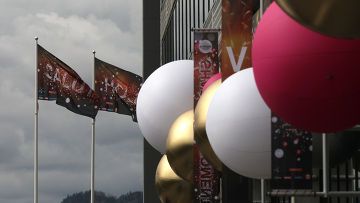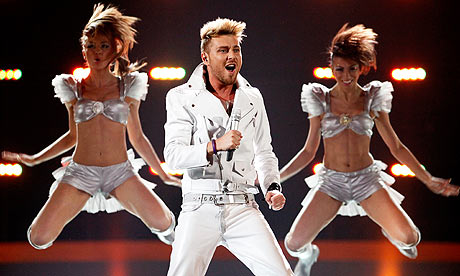Пузырь «Евровидения» может лопнуть из-за финансовых затруднений многих стран |
|
 Экономический спад заставил ряд стран отказаться от участия, а Осло, хозяин конкурса этого года, нервничает из-за нынешних расходов и перспективы повторения своего нынешнего подвига. Экономический спад заставил ряд стран отказаться от участия, а Осло, хозяин конкурса этого года, нервничает из-за нынешних расходов и перспективы повторения своего нынешнего подвига.
Конкурс песни «Евровидение» отмечает в этом году своё 55-летие, однако на праздновании этой годовщины, вероятно, отразится продолжающийся экономический спад. inosmi.ru, 28.05.10 Eurovision bubble goes pop as nations quit due to financial differences
Recession leads to several countries pulling out while host city Oslo nervous over costs and prospect of repeating the feat
The Eurovision song contest turns 55 this year, but any birthday celebrations are likely to be dampened by the continuing economic downturn. In what Eurovision experts are calling a "minimalistic" year for the competition, several countries have already withdrawn because of what organisers describe as financial restraints. Andorra, Montenegro and the Czech Republic have all dropped out, while Hungary decided not to enter a contestant this year. "Of course the economic crisis is affecting us, we have fewer countries competing this year and they all withdrew for the same reason – budget cuts," Svante Stockselius, the executive supervisor of Eurovision, told Reuters. Budget cuts have also forced Eurovision's host city, Oslo, to cut the total spend on the contest by a quarter. Moscow spent £28m on the show in 2009, a record at the time; not only have the Norwegians cut the budget to £21m, but its leading public broadcaster, NRK, has expressed doubts over whether it will be able to afford to show the contest again, should Norway win for a second year running. The winning country traditionally hosts the following year's contest. But not everyone considers the impact of the economic crisis to be wholly negative. "What NRK are trying to do is be innovative and creative, and a bit more minimalistic," the arts critic and Eurovision expert Karen Fricker told the BBC. "I think it's working, in that what they're doing with limited lighting effects and drapes is making each act look distinctive and giving each an individual presence on stage." NRK's reservations about a repeat performance as host are likely to be shared by smaller countries, that may not be able to afford to hold the contest should their contestant win. "I will feel sorry if Moldova or Azerbaijan win. Where will they get the money from to stage the competition next year?" said Inge Solmo, Norwegian author of the Eurovision book Absolute Grand Prix. However, Stockselius said that any country which entered the contest did so with the understanding they may be required to host the following year's event. "It's in the rules that if you participate, you must be able to host the contest." Traditionally, commercial sponsorship, advertising and an increase in tourism to the host nation can all help with the costs of running the contest. The contest is currently in the semi-final stages, with the 10 remaining finalists set to compete for the plaudit of best song in Europe this Saturday.
guardian.co.uk, 27.05.10
| |
|
Категория: Евровидение |
Просмотров: 2229 |
Добавил: eurovision
| Рейтинг: 0.0 |
| |

|




 Miro from Bulgaria performs his song Angel Si Ti during a dress rehearsal for the Eurovision song contest in Oslo Photograph: Bob Strong/Reuters
Miro from Bulgaria performs his song Angel Si Ti during a dress rehearsal for the Eurovision song contest in Oslo Photograph: Bob Strong/Reuters


